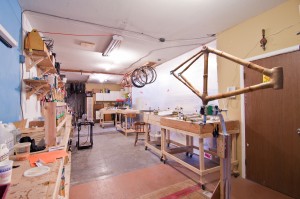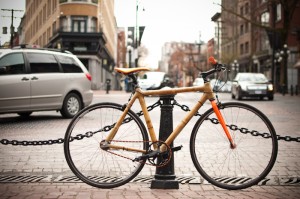Sustainable transportation has been an area of focus over the past twenty years; cars are becoming more fuel-efficient or run on alternative sources of energy all-together. However, I am going to focus on an industry that continues to make innovative and sustainable progress, despite already being leaps and bounds ahead of the automobile industry: bicycles.
Grass Frames is a Vancouver-based company that creates handmade bicycles from specially treated bamboo. The team, led by founder Al Roback, is passionate about creating a product that has an positive impact beyond just earning profits. Roback, who has been called an ‘eco-warrior’, works to reduce waste streams both during production and post consumption (his product is easily recyclable). Additionally, bamboo frames have advantages over traditional products with regards to vibration dampening, and have a uniqueness that helps to create visual appeal.
The amazing thing about Grass Frames is that, even with their success (they’ve been featured in articles around the lower mainland and h ave expanded throughout Western Canada), the company is still looking for ways to sustainably innovate. Using hemp fibres for joints and sourcing other materials locally are some of the ways Grass Frames continues to evolve, and the company has even begun growing its own bamboo, although that project will take time to come to fruition. Following in the footsteps of companies such as Patagonia (whose ‘5 R’ mantra they actually cite on their website), Grass Frames has created a successful business plan built on sustainable initiatives. I’m excited to follow the company in the future, and can’t wait for their future future breakthroughs.
ave expanded throughout Western Canada), the company is still looking for ways to sustainably innovate. Using hemp fibres for joints and sourcing other materials locally are some of the ways Grass Frames continues to evolve, and the company has even begun growing its own bamboo, although that project will take time to come to fruition. Following in the footsteps of companies such as Patagonia (whose ‘5 R’ mantra they actually cite on their website), Grass Frames has created a successful business plan built on sustainable initiatives. I’m excited to follow the company in the future, and can’t wait for their future future breakthroughs.
To learn more about Grass Frames, watch this short interview with Roback:

This is really cool! I have always had a love for bamboo and wish to see bamboo used more effectively as a resource, especially as a substitute for wood (paper). You see, bamboo grows much, much faster than a tree ever will. It is easier to replenish and sustain bamboo as a resource than a tree, which takes decades to grow before it reaches a useful size to current industries. I’ve come across disposable bamboo plates and dishes, such as the ones used in catering, and they were no lesser than paper, plastic, nor styrofoam flatware in any way! While single-use products are a major, major frown inducer to true sustainability, disposable products are likely not going to disappear during this lifetime, so why not find better materials to make them with, and reduce those massive piles of disposables in our landfills? Of course, there is also the aesthetic of bamboo, and its lightness attribute makes it wonderfully applicable to many industries. There may be economic reasons for why bamboo hasn’t caught on even more, but I hope to see better use of bamboo in the near future.
Wow great find Sam! I didn’t know that there were so many uses for bamboo. It’s very interesting to see how companies are able to use the different strategies of sustainable product development in order to make their company more sustainable. Is the solution to our sustainability problems moving to different materials? Although this company is being very sustainable, it ultimately does not answer the question of how we can reduce GHG emissions from the main method of transportation. Biking is a sustainable alternative to transportation in the first place and this company goes above and beyond this by making a sustainable bike. However our issue is that driving a car accounts for the majority of GHG emissions from the oil sands. What are ways we can make biking more popular in a city that rains most of the time? How can we make biking more convenient in the eyes of the consumer?
Hey Sam, thanks for posting this, bamboo bicycle looks really cool. And i totally agree with you that bamboo bicycle will be easy to recycle. But i am also wondering the price of bamboo bicycle. Since i checked their website about the price, i found out that one bicycle costs at least $3000 (they have different models and builds), it’s way more expensive than other normal bicycles. So i am a little bit afraid that it won’t be appealing for customers. However, i was think about Grass Frames could corporate with Vancouver government to launch Vanbike, it is kind of similar idea with citibike in NYC, but Vanbike is made from bamboo basically. This probably will solve the issue of high price and through this approach, people in Vancouver could also reduce the reliance on either private or public transportation. Really looking forward to seeing what they will do in the future.
Thanks for the comments Kristen and Paul!
To clarify Kristen, I am not trying to say that using bamboo-created materials will reduce emissions. I’m also not trying to say that these bicycles should be replacements for cars in Vancouver. I’m trying to express that there are alternative ways to building products that are more efficient and less wasteful. On an individual level, this doesn’t have a large impact, but for each new product that is created from bamboo, an additional value is added and it grows.
Paul, I totally get where you’re coming from. 3k is a lot, and as students we definitely don’t have that amount of cash lying around. I think we aren’t in Grass Frames’ target demographic, and so while it isn’t appealing to us, it may be appealing to professionals who are already willing to put money towards a bicycle for that much. Also, it may be too pricey for the government, but I would love to see some kind of partnership eventually, even if it’s with private tourist companies.